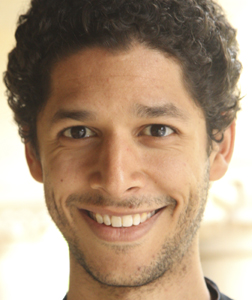
Gabriel Wilson

Gabriel Wilson
In my experience, any time we engage in a conversation about our differences with an intention to prove the other side wrong, we’re heading for a dead end. When we take a right-wrong stance to any conversation about difference — whether it’s about race or gender, politics or religion — it reveals that we’re more interested in affirming our positions (and our sense of self tied to those positions) than anything else.
Engaging this way also rests on a hidden belief: that the tension between our differences can be fixed. Even if by some miracle – by simply pointing out why “my” difference is right and “yours” is wrong – I do convert you to my side, this at best creates a false harmony. False, because it keeps our psyches untouched, our perspectives unchanged, and our ways of being with one another limited. The only real victory in this case is a shallow truce that avoids a greater complexity and, ultimately, a greater intimacy, in favor of a more complacent sense of safety.
As a facilitator, I’m interested in working with groups that are keen on developing themselves. I’ve found that one of the most essential ways we can foster growth is through engaging our differences. Consciously engaging our differences is transformational for our ability to learn and grow through relationships.
As I experiment with different ways to support curious, keen-to-grow groups, I’ve come to rely on some basic orienting frames for engaging differences in a way that has the greatest transformational impact.
First, we have to take the position that our differences are fundamentally irresolvable. There is nothing to solve, nothing to fix in our differences. When we realize that we literally cannot get rid of our differences (at best we can marginalize them from our awareness, at worst, attempt to exterminate them, i.e. genocide) — we get to drop much of our underlying anxiety that somehow, things aren’t okay if we are different.
Second, we embrace the view that we are in a growth process for our entire lives. The best studies on human development show clearly that adults grow and develop new capacities cognitively, emotionally, morally — even existentially — indefinitely. When we embrace this idea, our life’s challenges become opportunities for greater growth, not simply obstacles in our way to being comfortable.
And lastly, we make a personal commitment to allow ourselves to be grown by our differences. I think Harvard developmental psychologist and researcher Robert Kegan explains this best when he says, “…the nature of our conflict suggests not that the other side will not go away, but that it probably should not. The conflict is a likely consequence of one or both of us making prior, true, distinct, and whole our partial position. The conflict is potentially a reminder of our tendency to pretend to completeness when we are in fact incomplete. We may have this conflict because we need it to recover our truer complexity.”
For me, this commitment is precisely what it means to engage mindfulness in the midst of our differences. Almost inevitably, when we are engaged with one another and our differences lock horns we’ll become defensive and hunker down into ourselves and our positions. This response to difference has its roots in our basic primate ancestry and isn’t something we can re-wire without practice. Mindfulness is the practice of beginning to “choose out of” these defensive reactions. It frees us to become curious as to the limits of our “partial position,” and maybe even create a space for something new to grow us.
My mentor and colleague Diane Hamilton, author of Everything is Workable & co-founder of Integral Facilitator, says, “the capacity to take a perspective on our perspective is a bright line in human development.” This last commitment is all about pursuing that bright line inside ourselves.
My invitation is this: Let us be attentive the next time we enter a conflict with the intention of proving the other side wrong. Let us be suspicious of how we might be preserving our ‘self’ by holding onto our position and habitual ways of relating to others, because it is entirely possible—likely, I would say—that the purpose of the conflict isn’t to help us confirm what we already believe, but to help us discover something new.
So, let’s differ consciously with the full expectation that we will be someone else (and hopefully someone better) after our differences have had their way with us.
About the Author
Gabriel Wilson is a certified Integral Facilitator®, a Lecturer at Stanford University, and Chair of the Integral Diversity Initiative.
